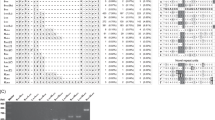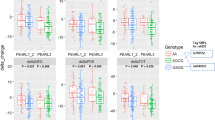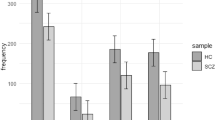Abstract
Several different lines of evidence suggest that genes involved in serotonergic neurotransmission are factors in the pathogenesis of schizophrenia. For example, 5-HT5A knockout mice revealed decreased locomotor response to lysergic diethylamide (LSD), which produces a psychotic-like state in healthy people. Recently, we reported a naturally occurring conservative Pro15Ser substitution in the 5-HT5A receptor. Here, we evaluate whether this substitution is associated with schizophrenia in a sample including 249 unrelated Japanese schizophrenia patients and 253 unrelated controls. Patients and controls were genotyped for the Pro15Ser polymorphism by a PCR-RFLP assay. Ser15 allele frequencies were 0.07 in patients with schizophrenia and 0.02 in controls (χ2 = 17.42, df =1, P < 0.0001). thus, we detected a highly significant association of pro15ser to schizophrenia in a large population of japanese schizophrenia patients and controls. since case-control studies have an inherent potential for false-positive results due to population stratification, this finding is preliminary pending further studies, including studies using the transmission/disequilibrium test to eliminate stratification bias or control loci to assess ethnic matching of cases and controls.
This is a preview of subscription content, access via your institution
Access options
Subscribe to this journal
Receive 12 print issues and online access
$259.00 per year
only $21.58 per issue
Buy this article
- Purchase on Springer Link
- Instant access to full article PDF
Prices may be subject to local taxes which are calculated during checkout
Similar content being viewed by others
References
O'Donovan MC, Owen MJ . Candidate-gene association studies of schizophrenia Am J Hum Genet 1999 65: 587–592
Murphy KC, Cardno AG, McGuffin P . The molecular genetics of schizophrenia J Mol Neurosci 1996 7: 147–157
Gaddum JH . Drugs antagonistic to 5-hydroxytryptamin. In: Wolstenholme GW (ed) Ciba Foundation Symposium on Hypertension Little Brown and Co: Boston MA 1954 75–77
Grailhe R, Waeber C, Dulawa SC, Hornung JP, Zhuang X, Brunner D et al. Increased exploratory activity and altered response to LSD in mice lacking the 5-HT5A receptor Neuron 1999 22: 581–591
Iwata N, Virkkunen M, Linnoila M, Goldman D . Identification of a naturally occurring Pro15-Ser15 substitution in the serotonin5A receptor gene in alcoholics and healthy volunteers Brain Res Mol Brain Res 1998 58: 217–220
Altshuler D, Kruglyak L, Lander E . Genetic polymorphisms and disease N Engl J Med 1998 338: 1626
Devlin B, Roeder K . Genomic control for association studies Biometrics 1999 55: 997–1004
Bacanu SA, Devlin B, Roeder K . The power of genomic control Am J Hum Genet 2000 66: 1933–1944
Pritchard JK, Rosenberg NA . Use of unlinked genetic markers to detect population stratification in association studies Am J Hum Genet 1999 65: 220–228
Pritchard JK, Stephens M, Rosenberg NA, Donnelly P . Association mapping in structured populations Am J Hum Genet 2000 67: 170–181
Spielman RS, McGinnis RE, Ewens WJ . Transmission test for linkage disequilibrium: the insulin gene region and insulin-dependent diabetes mellitus (IDDM) Am J Hum Genet 1993 52: 506–516
Peterson RJ, Goldman D, Long JC . Effects of worldwide population subdivision on ALDH2 linkage disequilibrium Genome Res 1999 9: 844–852
Shimron-Abarbanell D, Erdmann J, Vogt IR, Bryant SP, Spurr NK, Knapp M et al. Human 5-HT5A receptor gene: systematic screening for DNA sequence variation and linkage mapping on chromosome 7q34–q36 using a polymorphism in the 5′ untranslated region Biochem Biophys Res Commun 1997 233: 6–9
Erlander MG, Lovenberg TW, Baron BM, de Lecea L, Danielson PE, Racke M et al. Two members of a distinct subfamily of 5-hydroxytryptamine receptors differentially expressed in rat brain Proc Natl Acad Sci U S A 1993 90: 3452–3456
Plassat JL, Boschert U, Amlaiky N, Hen R . The mouse 5HT5 receptor reveals a remarkable heterogeneity within the 5HT1D receptor family EMBO J 1992 11: 4779–4786
Weir BS . Genetic Data Analysis II Sinauer Associates: Sunderland, MA 1996
Acknowledgements
This research was funded in part by Research Grant 10670923, and by a Grant-in-Aid for Scientific Research on Priority Areas (C) ‘Medical Genome Science’ from the Ministry of Education, Science, Sports and Culture of Japan and the Research Grant (9B-5) for Nervous and Mental Disorders from the Ministry of Health and Welfare of Japan (Drs Iwata and Ozaki). The authors thank Yukiko Yamamoto for her assistance.
Author information
Authors and Affiliations
Corresponding author
Rights and permissions
About this article
Cite this article
Iwata, N., Ozaki, N., Inada, T. et al. Association of a 5-HT5A receptor polymorphism, Pro15Ser, to schizophrenia. Mol Psychiatry 6, 217–219 (2001). https://doi.org/10.1038/sj.mp.4000829
Received:
Revised:
Accepted:
Published:
Issue Date:
DOI: https://doi.org/10.1038/sj.mp.4000829



